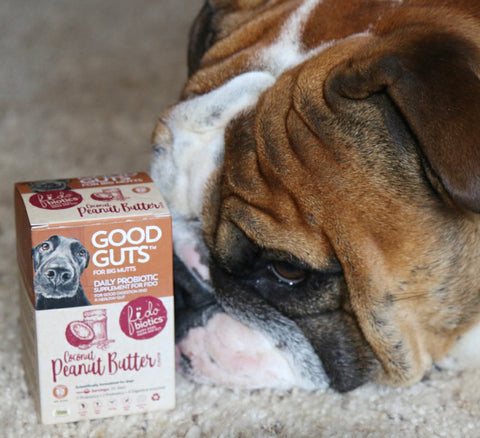Unveil the power of coconut in your dog's diet. Learn about its fatty acids, antioxidants, and safe incorporation methods for optimal canine health.

Over the years, coconut products have gained popularity for their health benefits in human diets. But as a pet parent, you might wonder, "Can dogs eat coconut?" The short answer is “Yes, in small amounts,” but a full answer is more complex.
While coconut offers your dog a wealth of nutrients and benefits, there are important considerations to remember. In this article, we’ll explore some safety factors for feeding coconut to your pup. We’ll review coconut products like whole coconuts, coconut oil, coconut meat, and coconut milk. Learn how these can enhance your furry friend's health, from boosting their immune system to improving their coat. Get ready to discover how coconut can be a delicious and nutritious addition to your canine companion's meals!
Coconut and Its Various Forms

Coconut is a unique and versatile fruit. And it's not just one product but a series of diverse items derived from the same source. The most common forms include:
Coconut Oil: Extracted from the flesh of mature coconuts, coconut oil is rich in medium-chain triglycerides (MCTs), including lauric acid, known for its health-promoting properties. It's widely used in cooking, skincare, and increasingly in pet health for its beneficial fatty acids. But be warned, MCTs may also cause gastrointestinal upset and bloating for dogs, so avoid large amounts of coconut products.
Coconut Water: The clear liquid inside young green coconuts, coconut water is naturally hydrating and packed with electrolytes, particularly potassium. It's a refreshing drink for humans and dogs alike, especially beneficial during hot weather or after exercise.
Coconut Milk: Made by grating and soaking coconut meat in water, coconut milk is a creamy, rich liquid. It contains a higher fat content than coconut water and offers a good source of vitamins and minerals. Coconut milk is generally safe to give to a dog in small amounts. Too much coconut milk can lead to diarrhea.
Coconut Shell: Do not give the shell to your pet! The hard shell of the coconut is a versatile byproduct used in crafting bowls, utensils, and decorative items. Its strength makes it suitable for household uses and even water purification. However, the fibrous shell can pose a choking hazard or intestinal blockage for dogs.
Coconut Meat: The white flesh inside a coconut, known as coconut meat, is high in dietary fiber, healthy fats, and a range of essential nutrients. It can be eaten raw, dried, or in the form of coconut flakes. Like coconut milk, too much coconut meat can cause loose stool or diarrhea.
Each form of coconut provides different nutritional benefits and can be incorporated into a dog's diet in various ways, offering added taste and a range of health benefits.
Health Benefits of Coconut
Nutritionally, coconut is a powerhouse. It's rich in:
Fatty Acids: As mentioned above, coconut is full of healthy fatty acids, including lauric acid, known for its antimicrobial and anti-inflammatory properties, which can help combat conditions like yeast infections and arthritis.
While coconut products can help ease the symptoms of these conditions, they should not replace a visit to the vet and treatment with medication. Please consult with your DVM.
Antioxidants: Like blueberries, coconuts contain antioxidants that help combat oxidative stress and support overall health.
Minerals: Essential minerals like potassium and manganese are widely available in coconut. Potassium benefits heart health and the proper functioning of muscles and nerves, while manganese plays a role in bone formation and metabolic processes.
Benefits of Coconut Products for Dogs

Skin Health: Topically, coconut oil is a wonder for dogs' skin health. It’s a great moisturizer known to decrease inflammation, making it ideal for treating itchy skin, dry patches, and hot spots.
Digestive System: Its easy digestibility and ability to aid in nutrient absorption make coconut a beneficial addition to dog nutrition, supporting overall gastrointestinal health.
Immune System: The MCTs in coconut oil can help support a dog's immune system, potentially warding off infections and illnesses.
Bone Health: The fatty acids in coconut oil can contribute to stronger bones, supporting overall mobility and joint health.
Coconut Risks and Considerations for Dogs
While coconut offers a variety of health benefits, it’s important to know how to responsibly incorporate it into your pup’s diet.
Gastrointestinal Sensitivity: Introduce coconut products to your dog's diet gradually. Sudden changes can lead to bloating or stomach upset, especially in small dogs or those with sensitive digestive systems.
Choking Hazards and Blockages: Make sure any coconut meat is free from the hard, fibrous husk, which can be a choking hazard. Large pieces of coconut can also cause blockages, so it's best to offer coconut in small, manageable amounts.
Allergic Reactions and Food Sensitivities: Monitor your dog's reaction to new foods like coconut, as some may have food allergies or sensitivities.
Obesity and Pancreatitis Risk: Be mindful of the calorie content in coconut products. Excessive intake of high-fat foods like coconut oil can lead to weight gain and increase the risk of pancreatitis.
Choosing the Right Coconut Product
It is best to opt for virgin coconut oil for your furry friend. It's less processed, meaning it retains more beneficial nutrients. Also, be cautious with coconut-flavored products, as some may contain xylitol or added sugars, which are harmful to dogs.
Safely Incorporating Coconut into Your Dog's Diet

Dog owners should always seek veterinary advice before changing their pet’s diet. Generally, it is wise to begin with a small amount of coconut product, around a quarter teaspoon of coconut oil for smaller dogs, gradually increasing to the desired amount over weeks and months. Take time to observe how your dog’s body responds to the new food item. It’s important to note that while incorporating coconut products as a supplement to your dog's regular diet can be beneficial, it should not replace essential elements of their meals.
Practical Tips for Incorporation
- Coconut Oil as a Supplement or Moisturizer: Use coconut oil in your dog's food or apply it topically for skin conditions like itchy skin or hot spots.
- Coconut Water and Milk: Offer coconut water as a hydrating treat, and use coconut milk sparingly due to its higher fat content.
- Coconut Meat and Flour: Include finely shredded coconut meat or coconut flour as part of homemade dog treats, ensuring they are free from the hard shell.
Consultation with a Veterinarian:
- Always consider any changes to your dog’s diet under the guidance of a veterinarian, particularly for dogs with specific health conditions. This ensures that including coconut products is beneficial and suitable for your dog's health needs.
Homemade Coconut Treat Recipe
Ingredients:
- 1½ cups coconut flour
- ½ cup melted coconut oil
- 4 eggs
- 1 cup unsweetened shredded coconut
- ½ cup chicken or beef broth (make sure it's low-sodium and onion/garlic-free)
Instructions:
- Preheat Oven: Set your oven to 350°F (175°C) and line a baking sheet with parchment paper.
- Mix Dry Ingredients: Combine the coconut flour and shredded coconut in a large mixing bowl.
- Add Wet Ingredients: Stir in the melted coconut oil and eggs. Mix until well combined. The mixture might be a bit crumbly due to the nature of coconut flour.
- Add Broth: Gradually add the chicken or beef broth to the mixture. The dough should be firm but moist enough to roll into balls.
- Shape Treats: Roll the dough into small, bite-sized balls or use a cookie cutter to create fun shapes. If the dough is too dry, add a bit more broth; if it's too wet, add a little more coconut flour.
- Bake the Treats: Place the treats on the prepared baking sheet. Flatten them slightly if they're in ball form. Bake for about 20-25 minutes or until they are firm and slightly golden.
- Cool Down: Let the treats cool completely on a wire rack before serving them to your dog.
- Storage: Store these coconut treats in an airtight container in the refrigerator for up to a week. You can also freeze them for longer storage.
Notes:
- Always ensure that any broth used in pet recipes is free from onions, garlic, and excessive salt, as these can harm dogs.
- Introduce new treats to your dog's diet gradually and in moderation.
- Keep an eye on your dog’s reaction to new foods, and consult your vet if you have any concerns about their diet.
So, is Coconut Good For Dogs?

Yes! Coconut can be a great supplement for dogs when included in a balanced diet. This versatile ingredient, in moderation, offers a range of health benefits, from supporting the immune system and improving skin health to providing essential fatty acids. However, like any dietary addition, the key is moderation and ensuring it complements your dog’s regular meals.
Speaking of complementing your dog's diet, if you're looking for ways to further enhance your furry friend's health regimen, explore Fidobiotcs’ line of coconut peanut butter probiotic supplements. With Fidobiotics, you can be confident in providing your dog not just with good nutrition but with the best that supplements have to offer.

My jack Russel came to me in a terrible state her fur was coming out in hand fulls , I tried coconut butter , a little with her meal half a teaspoon every other day .
I haven’t looked back since , she stopped shedding , and has a beautiful wavy coat . Recommend coconut butter to all my doggie friends .